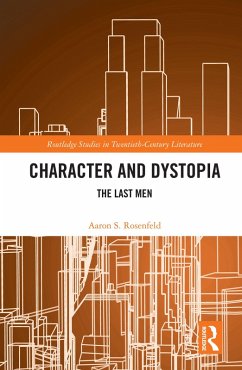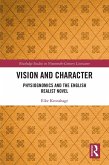42,95 €
42,95 €
inkl. MwSt.
Sofort per Download lieferbar

21 °P sammeln
42,95 €
Als Download kaufen

42,95 €
inkl. MwSt.
Sofort per Download lieferbar

21 °P sammeln
Jetzt verschenken
Alle Infos zum eBook verschenken
42,95 €
inkl. MwSt.
Sofort per Download lieferbar
Alle Infos zum eBook verschenken

21 °P sammeln
- Format: PDF
- Merkliste
- Auf die Merkliste
- Bewerten Bewerten
- Teilen
- Produkt teilen
- Produkterinnerung
- Produkterinnerung

Bitte loggen Sie sich zunächst in Ihr Kundenkonto ein oder registrieren Sie sich bei
bücher.de, um das eBook-Abo tolino select nutzen zu können.
Hier können Sie sich einloggen
Hier können Sie sich einloggen
Sie sind bereits eingeloggt. Klicken Sie auf 2. tolino select Abo, um fortzufahren.

Bitte loggen Sie sich zunächst in Ihr Kundenkonto ein oder registrieren Sie sich bei bücher.de, um das eBook-Abo tolino select nutzen zu können.
Character and Dystopia examines dystopian characterization through analysis of the "last man" figure. By reading character as crucial to the dystopian project, the book makes a case for dystopia as a sensitive register of modern anxieties about subjectivity and its portrayal in literary works.
- Geräte: PC
- ohne Kopierschutz
- eBook Hilfe
- Größe: 2.01MB
Andere Kunden interessierten sich auch für
![Living with Monsters (eBook, PDF) Living with Monsters (eBook, PDF)]() Indrani DebLiving with Monsters (eBook, PDF)46,95 €
Indrani DebLiving with Monsters (eBook, PDF)46,95 €![The Routledge Companion to Literature and Emotion (eBook, PDF) The Routledge Companion to Literature and Emotion (eBook, PDF)]() The Routledge Companion to Literature and Emotion (eBook, PDF)46,95 €
The Routledge Companion to Literature and Emotion (eBook, PDF)46,95 €![Vision and Character (eBook, PDF) Vision and Character (eBook, PDF)]() Eike KronshageVision and Character (eBook, PDF)43,95 €
Eike KronshageVision and Character (eBook, PDF)43,95 €![Evolutions of Jewish Character in British Fiction (eBook, PDF) Evolutions of Jewish Character in British Fiction (eBook, PDF)]() Aaron KaisermanEvolutions of Jewish Character in British Fiction (eBook, PDF)43,95 €
Aaron KaisermanEvolutions of Jewish Character in British Fiction (eBook, PDF)43,95 €![Shakespeare's Rhetoric of Comic Character (eBook, PDF) Shakespeare's Rhetoric of Comic Character (eBook, PDF)]() Karen NewmanShakespeare's Rhetoric of Comic Character (eBook, PDF)46,95 €
Karen NewmanShakespeare's Rhetoric of Comic Character (eBook, PDF)46,95 €![National Character in South African English Children's Literature (eBook, PDF) National Character in South African English Children's Literature (eBook, PDF)]() Elwyn JenkinsNational Character in South African English Children's Literature (eBook, PDF)13,95 €
Elwyn JenkinsNational Character in South African English Children's Literature (eBook, PDF)13,95 €![Sketches of Irish Character (eBook, PDF) Sketches of Irish Character (eBook, PDF)]() Marion DurninSketches of Irish Character (eBook, PDF)42,95 €
Marion DurninSketches of Irish Character (eBook, PDF)42,95 €-
-
-
Character and Dystopia examines dystopian characterization through analysis of the "last man" figure. By reading character as crucial to the dystopian project, the book makes a case for dystopia as a sensitive register of modern anxieties about subjectivity and its portrayal in literary works.
Dieser Download kann aus rechtlichen Gründen nur mit Rechnungsadresse in A, B, BG, CY, CZ, D, DK, EW, E, FIN, F, GR, HR, H, IRL, I, LT, L, LR, M, NL, PL, P, R, S, SLO, SK ausgeliefert werden.
Produktdetails
- Produktdetails
- Verlag: Taylor & Francis eBooks
- Seitenzahl: 286
- Erscheinungstermin: 8. Juli 2020
- Englisch
- ISBN-13: 9781000173154
- Artikelnr.: 59806086
- Verlag: Taylor & Francis eBooks
- Seitenzahl: 286
- Erscheinungstermin: 8. Juli 2020
- Englisch
- ISBN-13: 9781000173154
- Artikelnr.: 59806086
- Herstellerkennzeichnung Die Herstellerinformationen sind derzeit nicht verfügbar.
Aaron Rosenfeld holds a Ph.D. in English Literature from New York University and is Associate Professor of English at Iona College, teaching classes in 20th-century literature.
1 Introduction: The Last Men in Europe
2 The Character of Dystopia
The Language of Despair
Realist Dystopia
Setting and Character
Setting as Character
3 What We Talk About When We Talk About Dystopia
The Good Place
Anti-utopianism and Anti-utopias
Dystopian Narrative
Dystopian Law
Post-apocalypse
Future (Im)Perfect
Section II De-forming Character
4 The Last (Hu)Man(ist)
Humanism in Crisis
Utopian and Dystopian Humanism and Anti-humanism
Dystopianism, Naturalism, and Modernism
Defensive Forms: Humanism, Anti-humanism, and the Dystopian Novel
Dystopian Humanism
Dystopian Anti-humanism
5 Anti-Bildungsroman: Dystopia and the End of Character in Zamyatin,
Burgess, and Ishiguro
The Novel of De-formation
Allegories of Progress
Divine Minus: Zamyatin's Reverse Bildungsroman
The Predator's Progress: Burgess's Satiric Bildungsroman
Crimes Against Posthumanity: Ishiguro's Bildungsroman Incarnate
6 Paranoid Plots: Dystopia and the Fantasy of Centrality in Dostoevsky and
Orwell
Romantic Paranoia
Paranoid Poetics
"Streets that follow like a tedious argument/ Of insidious intent"
Diseased Romanticism: Dostoevsky's Psychological Dystopia
He Loved Big Brother: Orwell and the Fantasy of Persecution
Section III Dystopian Variations
7 American Anti-pastoral: Running Down a Dream in West and Mamet
Dystopian Design
What Happens to a Dream Deformed?
West's World: Dystopian Picaresque in West's A Cool Million
Utopian Plots: Dystopian Capitalism in Mamet's Glengarry Glen Ross
8 Romancing the Child: First Teens in Lowry's The Giver and Butler's
Parable of the Sower
First Teens
New Worlds for Old Desires
A Family Affair: Romantic Humanism in Lowry's The Giver
On the Road Again: Anti-romantic Anti-humanism in Butler's Earthseed
9 Epilogue: The Dystopian Real
2 The Character of Dystopia
The Language of Despair
Realist Dystopia
Setting and Character
Setting as Character
3 What We Talk About When We Talk About Dystopia
The Good Place
Anti-utopianism and Anti-utopias
Dystopian Narrative
Dystopian Law
Post-apocalypse
Future (Im)Perfect
Section II De-forming Character
4 The Last (Hu)Man(ist)
Humanism in Crisis
Utopian and Dystopian Humanism and Anti-humanism
Dystopianism, Naturalism, and Modernism
Defensive Forms: Humanism, Anti-humanism, and the Dystopian Novel
Dystopian Humanism
Dystopian Anti-humanism
5 Anti-Bildungsroman: Dystopia and the End of Character in Zamyatin,
Burgess, and Ishiguro
The Novel of De-formation
Allegories of Progress
Divine Minus: Zamyatin's Reverse Bildungsroman
The Predator's Progress: Burgess's Satiric Bildungsroman
Crimes Against Posthumanity: Ishiguro's Bildungsroman Incarnate
6 Paranoid Plots: Dystopia and the Fantasy of Centrality in Dostoevsky and
Orwell
Romantic Paranoia
Paranoid Poetics
"Streets that follow like a tedious argument/ Of insidious intent"
Diseased Romanticism: Dostoevsky's Psychological Dystopia
He Loved Big Brother: Orwell and the Fantasy of Persecution
Section III Dystopian Variations
7 American Anti-pastoral: Running Down a Dream in West and Mamet
Dystopian Design
What Happens to a Dream Deformed?
West's World: Dystopian Picaresque in West's A Cool Million
Utopian Plots: Dystopian Capitalism in Mamet's Glengarry Glen Ross
8 Romancing the Child: First Teens in Lowry's The Giver and Butler's
Parable of the Sower
First Teens
New Worlds for Old Desires
A Family Affair: Romantic Humanism in Lowry's The Giver
On the Road Again: Anti-romantic Anti-humanism in Butler's Earthseed
9 Epilogue: The Dystopian Real
1 Introduction: The Last Men in Europe
2 The Character of Dystopia
The Language of Despair
Realist Dystopia
Setting and Character
Setting as Character
3 What We Talk About When We Talk About Dystopia
The Good Place
Anti-utopianism and Anti-utopias
Dystopian Narrative
Dystopian Law
Post-apocalypse
Future (Im)Perfect
Section II De-forming Character
4 The Last (Hu)Man(ist)
Humanism in Crisis
Utopian and Dystopian Humanism and Anti-humanism
Dystopianism, Naturalism, and Modernism
Defensive Forms: Humanism, Anti-humanism, and the Dystopian Novel
Dystopian Humanism
Dystopian Anti-humanism
5 Anti-Bildungsroman: Dystopia and the End of Character in Zamyatin,
Burgess, and Ishiguro
The Novel of De-formation
Allegories of Progress
Divine Minus: Zamyatin's Reverse Bildungsroman
The Predator's Progress: Burgess's Satiric Bildungsroman
Crimes Against Posthumanity: Ishiguro's Bildungsroman Incarnate
6 Paranoid Plots: Dystopia and the Fantasy of Centrality in Dostoevsky and
Orwell
Romantic Paranoia
Paranoid Poetics
"Streets that follow like a tedious argument/ Of insidious intent"
Diseased Romanticism: Dostoevsky's Psychological Dystopia
He Loved Big Brother: Orwell and the Fantasy of Persecution
Section III Dystopian Variations
7 American Anti-pastoral: Running Down a Dream in West and Mamet
Dystopian Design
What Happens to a Dream Deformed?
West's World: Dystopian Picaresque in West's A Cool Million
Utopian Plots: Dystopian Capitalism in Mamet's Glengarry Glen Ross
8 Romancing the Child: First Teens in Lowry's The Giver and Butler's
Parable of the Sower
First Teens
New Worlds for Old Desires
A Family Affair: Romantic Humanism in Lowry's The Giver
On the Road Again: Anti-romantic Anti-humanism in Butler's Earthseed
9 Epilogue: The Dystopian Real
2 The Character of Dystopia
The Language of Despair
Realist Dystopia
Setting and Character
Setting as Character
3 What We Talk About When We Talk About Dystopia
The Good Place
Anti-utopianism and Anti-utopias
Dystopian Narrative
Dystopian Law
Post-apocalypse
Future (Im)Perfect
Section II De-forming Character
4 The Last (Hu)Man(ist)
Humanism in Crisis
Utopian and Dystopian Humanism and Anti-humanism
Dystopianism, Naturalism, and Modernism
Defensive Forms: Humanism, Anti-humanism, and the Dystopian Novel
Dystopian Humanism
Dystopian Anti-humanism
5 Anti-Bildungsroman: Dystopia and the End of Character in Zamyatin,
Burgess, and Ishiguro
The Novel of De-formation
Allegories of Progress
Divine Minus: Zamyatin's Reverse Bildungsroman
The Predator's Progress: Burgess's Satiric Bildungsroman
Crimes Against Posthumanity: Ishiguro's Bildungsroman Incarnate
6 Paranoid Plots: Dystopia and the Fantasy of Centrality in Dostoevsky and
Orwell
Romantic Paranoia
Paranoid Poetics
"Streets that follow like a tedious argument/ Of insidious intent"
Diseased Romanticism: Dostoevsky's Psychological Dystopia
He Loved Big Brother: Orwell and the Fantasy of Persecution
Section III Dystopian Variations
7 American Anti-pastoral: Running Down a Dream in West and Mamet
Dystopian Design
What Happens to a Dream Deformed?
West's World: Dystopian Picaresque in West's A Cool Million
Utopian Plots: Dystopian Capitalism in Mamet's Glengarry Glen Ross
8 Romancing the Child: First Teens in Lowry's The Giver and Butler's
Parable of the Sower
First Teens
New Worlds for Old Desires
A Family Affair: Romantic Humanism in Lowry's The Giver
On the Road Again: Anti-romantic Anti-humanism in Butler's Earthseed
9 Epilogue: The Dystopian Real







